As of February, guidance from the Centers for Disease Control and Prevention is clear: “Travel increases your chances of getting and spreading COVID-19. CDC recommends that you do not travel at this time. Delay travel and stay home to protect yourself and others from COVID-19.”
Yes, our editors took these trips pre-pandemic. And, no, for the most part we haven’t been boarding planes. But we think now is as good a time as any to plan an idyllic getaway for when the world opens up again. Until then, we’ll dream on.
Costa Rica
Peninsula Papagayo
Peninsula Papagayo sticks out into the Pacific Ocean like a crooked little finger in the far northwest corner of the province of Guanacaste. It lies between the more popular surf-oriented beaches around Tamarindo and the remote wilds of Santa Rosa National Park. What makes it worth seeking out is the way it straddles aspects of these two worlds, blending access to rugged wilderness and luxurious accommodations in a location that lies between ocean and bay, mountains and coast.
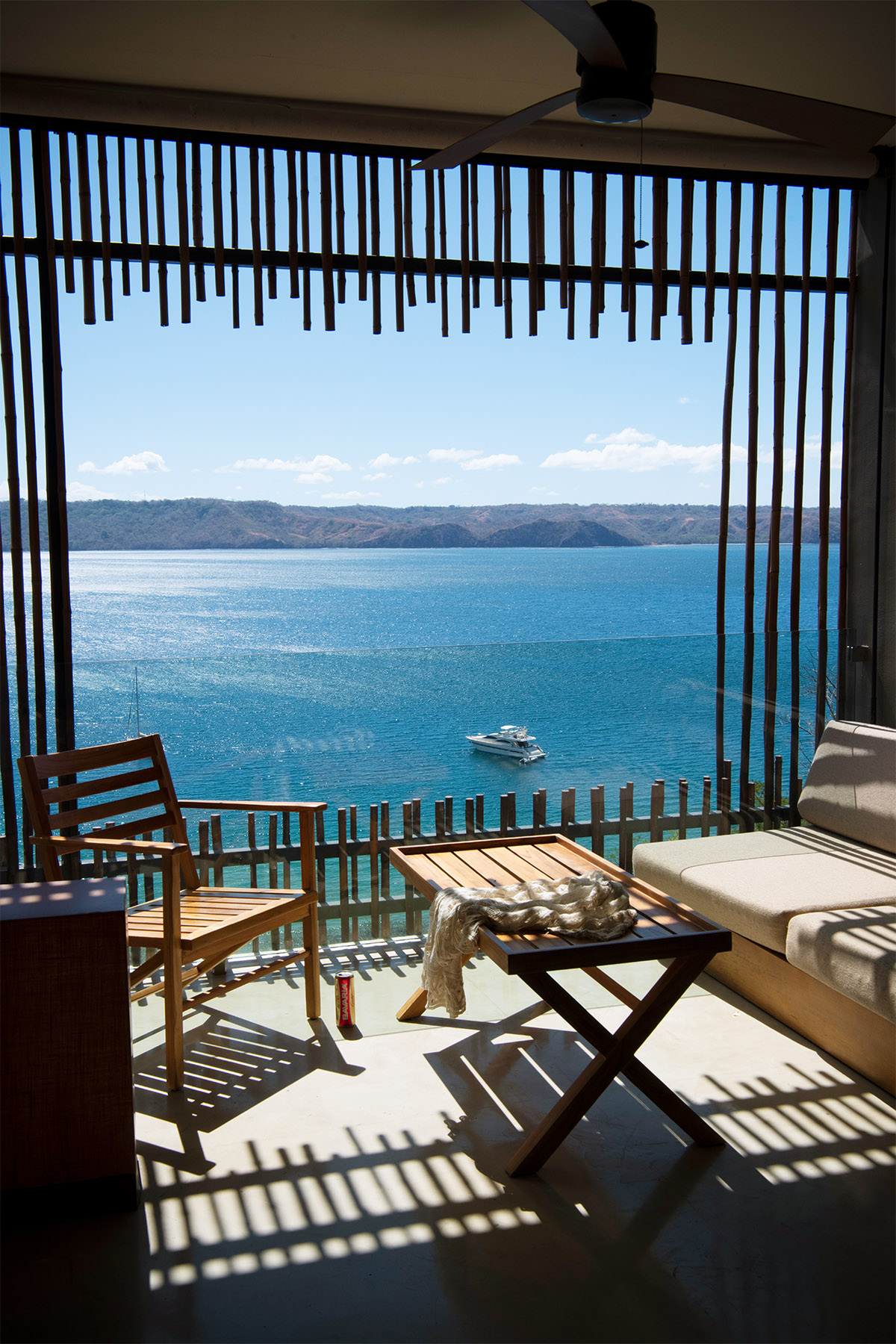
You can step out of your hotel room and, within a few minutes, find yourself hiking along jungle paths as monkeys swing overhead.
Elizabeth Lavin
The peninsula is essentially a large gated community inside a tropical dry forest, with multimillion-dollar homes, an Arnold Palmer-designed golf course, and two luxury resorts: the Andaz Costa Rica and the Four Seasons Costa Rica at Peninsula Papagayo. But strict regulations have helped restrain the footprint of this development to preserve the peninsula’s natural ecology. It’s a delicate balance, but one that works. You can step out of your hotel room and, within a few minutes, find yourself hiking along jungle paths as monkeys swing overhead, or swimming over rocky coral reefs with stingrays and sea turtles. For nature lovers who don’t want to sacrifice the perks of a pampered vacation getaway, it is hard to think of a more ideal spot.
The Four Seasons sits at a narrow neck near the tip of the peninsula, which allows you to walk from its bayfront beaches to the ocean in a matter of seconds, while restaurants, bars, and watersport rentals are always a stone’s throw away. The Andaz is the new kid on the block, and what it lacks in the Four Seasons’ boisterousness it makes up for in intimacy. Designed by Costa Rican architect Ronald Zürcher, the Andaz’s treehouse-like accommodations blend sensitively into the forest canopy, and rooms offer stunning views of a bay that doubles as a humpback whale sanctuary during migration season.
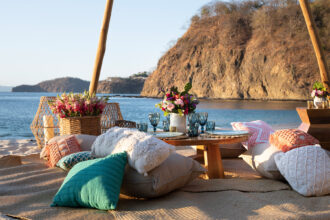
Elizabeth Lavin
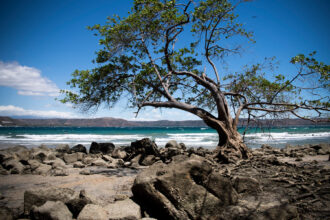
Elizabeth Lavin
Krill Joy: Designed by Costa Rican architect Ronald Zürcher, the Andaz’s treehouse-like accommodations blend sensitively into the forest canopy, and rooms offer stunning views of a bay that doubles as a humpback whale sanctuary during migration season.
You never have to leave the resort’s gates, but after a few days playing on the peninsula, I was eager to escape. Renting a car and heading down the coast led to a string of beautiful beaches. The grungy hippie haven of Tamarindo has been attracting expats for decades, but you’ll be happier seeking out more out-of-the-way spots like the semi-secluded crystalline waters of Playa Conchal. Adventurous travelers will be rewarded pushing on farther south along Costa Rica’s infamously difficult roads. Playa San Juanillo offers a rocky expanse of coastline as tempestuously sublime as Big Sur. At the Ostional Nacional Wildlife Refuge, a local guide will lead you onto the beach at dusk to witness another quintessentially Costa Rican ritual: baby sea turtles hatching in the sand and flapping their way into the sea. —Peter Simek
Riviera Maya, Mexico
Mayakoba
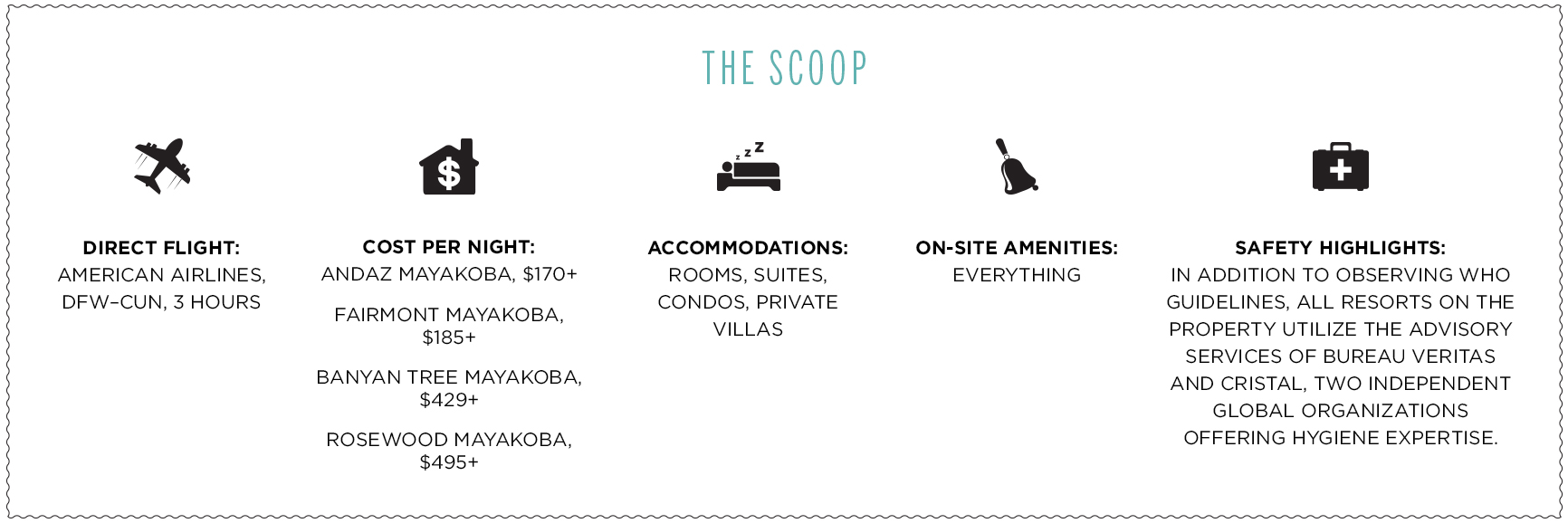
What do you do when you have 620 acres of jungle but only 1 mile of prime beach access? You create an eco-friendly wonderland, where resorts are carefully set back from the ocean in a dense, tangled network of mangroves, protected from hurricanes and connected by a series of canals and lagoons. You may think you want an ocean view, but here you quickly learn there’s something better. Like being deposited by boat on the dock of your lagoon-facing suite, with a private butler waiting to make you a welcoming tequila cocktail and an open-air shower to rinse off your previous life.
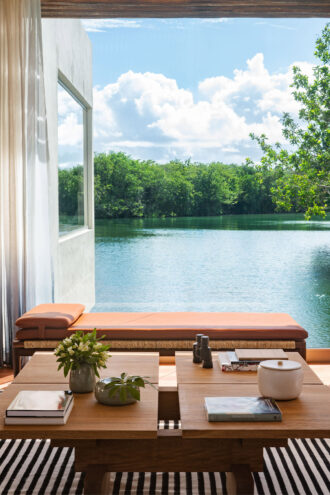
There are four separate properties on site, including the Rosewood Mayakoba, which offers boat and butler service for its lagoon-facing studio suites
Elizabeth Lavin
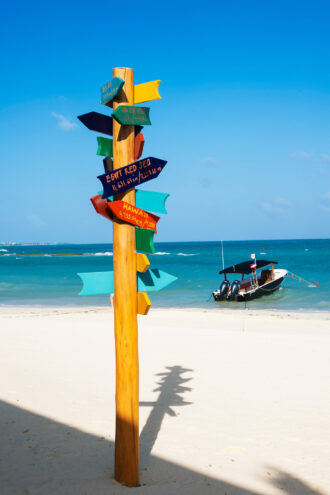
The Mayakoba Dive & Water Sports Center offers dive training and certification, snorkeling, jet skiing, kayaking, paddleboarding, sailing, and volleyball
Elizabeth Lavin
Mayakoba was developed at the turn of this century, with oversight by biologists and ecologists. There are four separate properties on site: the aforementioned Rosewood, the swankiest of the lot with its boat and butler service; the Asian-inspired Banyan Tree, with private villas and plunge pools; the more mod and modest Andaz, with hotel room options; and the Fairmont, the largest and most family-friendly property (with a food and beverage program overseen by Dallas’ own Michael Martensen). You can travel among them all by boat, buggy, or bike. And the beach, with bars and restaurants servicing each resort, is a short jaunt away.
There’s no lack of activities. There are four tennis courts; the Greg Norman-designed El Camaleón golf course; private snorkeling tours; a marina that can outfit all your favorite watersports; and a re-created Mexican village square complete with a Catholic chapel, arcade for the kids, and a cantina with the best tostadas you’ll ever eat. You can even rent the VanDutch yacht of Skyfall fame, upholstered in Hermès, for about $7,000 a day.
There are also two dozen restaurants to choose from. My most memorable meal was on my last night, at the Rosewood’s La Ceiba Kitchen & Garden, an open-air dining experience under the outstretched arms of a sacred Mayan tree. I was met with a lemongrass margarita in a taza de barro, and escorted through a fairy-lit garden filled with herbs and peppers to a long wooden table. Caribbean lobster and hibiscus-glazed lamb chops, seared in front of us over traditional zapote wood, were served family style, accompanied by wines from Mexico’s oldest vineyard.
My dining companions and I outlasted the mariachis and the last embers of the grill. Strangers at the start of the night, we were baring surprising parts of our souls and laughing to tears by the end. I swear it wasn’t the tequila. It was that magic ceiba tree. —Kathy Wise
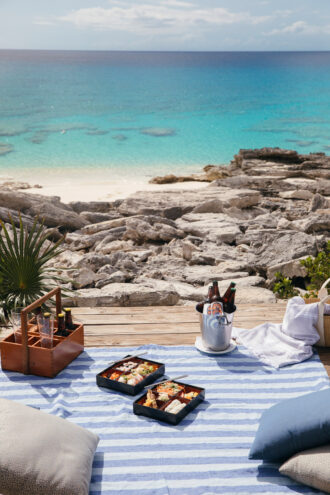
Courtesy of Amanyara
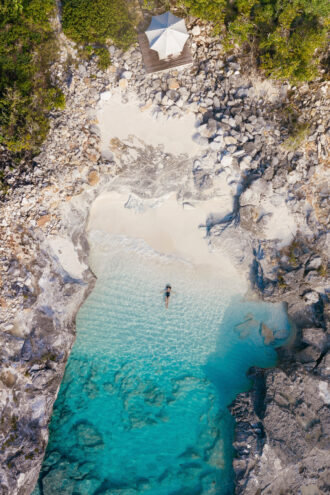
Courtesy of Amanyara
At Amanyara, set along the secluded Northwest Point Marine National Park, wildlife abounds. The reefs are home to hawksbill turtles, bonefish, and humpback whales, while hundreds of migratory bird species frequent the 870- yard beach.
Turks and Caicos
Amanyara
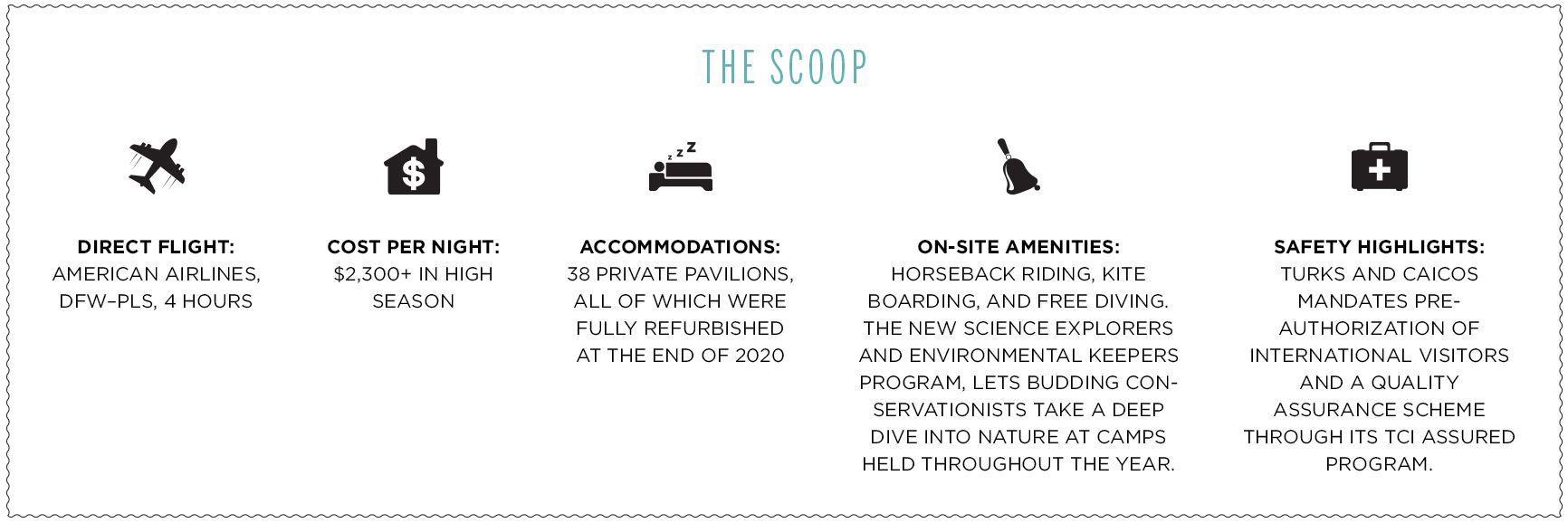
What greeted us at our pavilion through the floor-to-ceiling windows was something out of a postcard: blue sky, bluer water, and a private ocean cove guarded by limestone peninsulas on either side. We sat on our beach chairs and listened to the waves crash against the rocks, until hunger pangs finally made us move.
A golf cart—how guests navigate the vast property situated on the shores of an 18,000-acre nature preserve—transported us to the restaurant for dinner. The Asian-inspired poolside meal prepared by one of Amanyara’s private chefs began with papaya salad and ended with mango sticky rice so addictive I finished off both our portions.
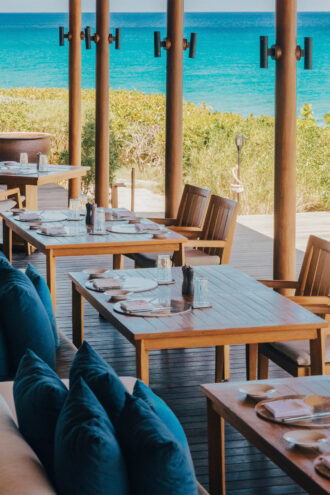
Courtesy of Amanyara
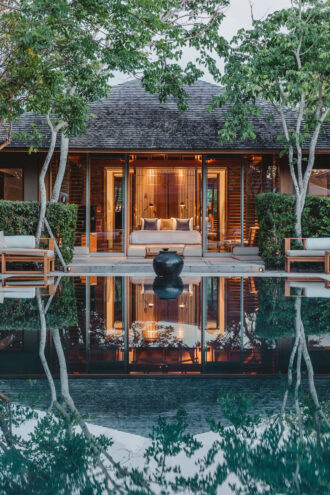
Courtesy of Amanyara
Only lakeside yoga could pry me from my cloudlike bed the following morning at 8. The breeze carried the aroma of incense as I moved into downward-facing dog. Chakras aligned, I explored more of the resort, including the tennis and sand volleyball courts, Pilates studio, soccer field, and a villa (with its own recording studio) that Prince had owned years ago.
Later, we boarded a snorkel boat with the resident marine biologist to explore the nearby reef, part of Northwest Point Marine National Park. The fish and coral were impressive, until we spotted an eagle ray and a sizable reef shark along the 7,000-foot sea wall drop-off, about 40 feet below our half-submerged snorkel tubes.
Back at shore, with salt caked in our hair, we filled up on more seafood and relaxed in our cove until the setting sun signaled it was time for cocktail hour. After whiskey smashes and dinner, we decided to go for a walk on the now-deserted beach. The waves were lit only by the stars. —Christiana Nielson
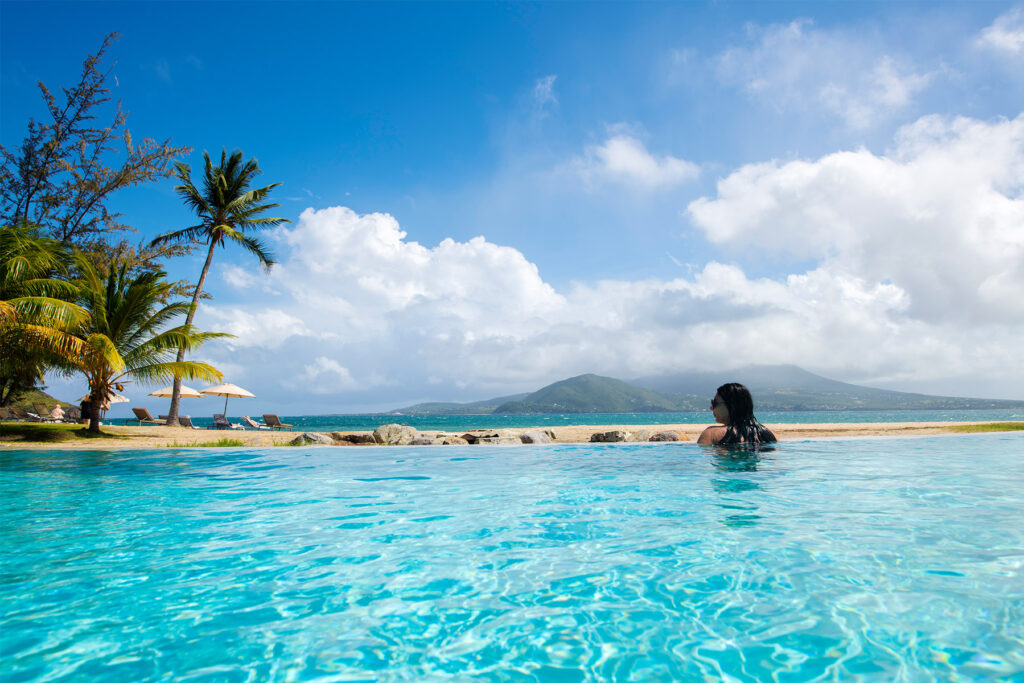
Weekend Warrior: The Park Hyatt St. Kitts, which opened in 2017, includes two on-site pools and the Sugar Mill Spa & Sanctuary.
Elizabeth Lavin
St. Kitts
Park Hyatt

Winding through the streets of St. Kitts, an island nestled in the Eastern Caribbean, roughly 1,200 miles from Miami, the taxi I’m riding in passes lush greenery and colorful houses. “There are more monkeys on this island than people,” the driver jokes, as I spot budding mango trees with half-eaten fruit lying at their trunks.
I’m here in June 2019 for the island’s annual three-night Caribbean music festival (this year, tentatively June 24–26), the largest in the world. For a couple of decades running, the St. Kitts Music Festival has generated millions of dollars for the local economy, and it now draws more than 27,000 attendees. Caribbean artists stack the lineup, punctuated by popular acts like French Montana and Ella Mai, along with legendary Motown crooner Smokey Robinson.
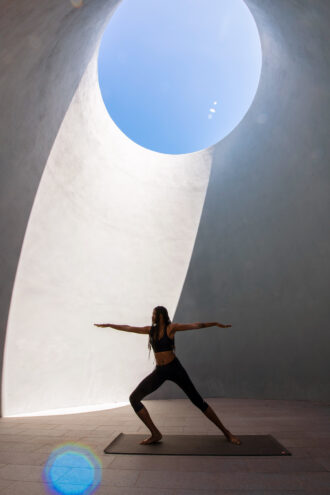
The Sugar Mill Spa & Sanctuary features an outdoor meditation and yoga space inspired by the island’s historic conical sugar mills.
Elizabeth Lavin
Between late-night soca sets, I find time to drink and dine. At the Park Hyatt’s Fisherman’s Village restaurant, overlooking Banana Bay with the neighboring island of Nevis in the distance, I enjoy open-air seating and ceviche; coconut curried shrimp and rice; and what will quickly become my Kittitian cocktail tradition, the Dark and Stormy, made with ginger beer and dark Caribbean rum.
The next day, I board a water taxi for a seven-minute ride to Nevis, famously known as Alexander Hamilton’s birthplace. Goats run freely alongside my ATV as I visit old sugarcane mills and walk the beach at Black Sand Cove. Day drinking takes on a new meaning as I joyously go “limin’, ” as they say here, passing time at Sunshine’s Beach Bar & Grill with its signature Killer Bee cocktail.
Back in my room, I step barefoot onto the patio, soaking in the mountainous terrain. The music now a memory, I allow the sounds of the ocean, wind, and monkeys to rock me to sleep. — Leah Frazier
Puerto Vallarta, Mexico
Four Seasons Resort Punta Mita

Sitting 45 minutes northwest of Puerto Vallarta on the Riviera Nayarit, the Four Seasons is one of two resorts inside a private peninsula known as Punta Mita, a gated slice of coastal Mexico with guts that are all jungle, golf carts, dim roadway lights, and roundabouts. The Four Seasons is scenic and secluded, home to 173 casitas and 31 suites revamped in 2014.
You could spend a week or more under the spell of the resort’s service. You could lean oceanward from the infinity pool and sprawl out on the beach. You could feast at Dos Catrinas, the open-air, two-story restaurant—one of several at the resort—where they haul out a tray of four salsas when you sit down. You could sip Mexican craft beers that may surprise you. You could drop your kids, if you have any, at the resort’s daycare and then order poolside sushi at the adults-only swim area. You could get massages on the beach or at the elaborate spa; I’m told the cactus treatment is really quite nice. You could go diving or surfing. You could watch the sun fall into the ocean beyond the palms from your patio, finding your well-stocked minibar all too convenient. Do all these.
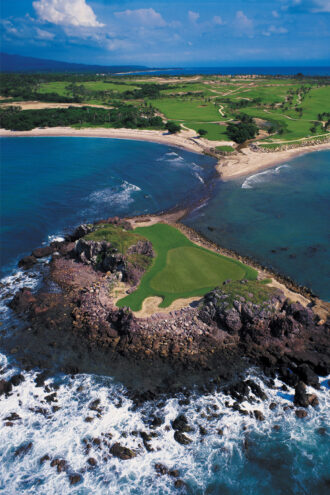
The Tail of the Whale is a bucket-list par-3 where the green is set on a giant rock formation some 200 yards out into the ocean.
Courtesy of Four Seasons Resort Punta Mita
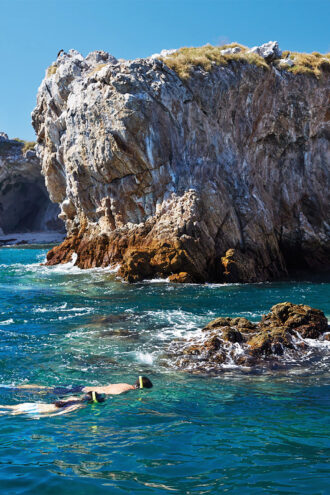
If water hazards are your thing, try snorkeling or paddleboarding.
Courtesy of Four Seasons Resort Punta Mita
But Punta Mita offers something even more special for anyone who enjoys swinging a golf club. It has two Jack Nicklaus-designed courses, both of them among Golf Digest’s top 15 in Mexico, both of them striking a nice note between playable and challenging, both of them a pull-hook from the Pacific Ocean. Pacifico has become known for the Tail of the Whale, a bucket-list par-3 where the green is set on a giant rock formation some 200 yards out into the ocean; it’s an optional 19th hole you can walk to only when the tide is low, and otherwise amphibious vehicle is required.
Almost everything in Punta Mita is made to slow your pulse. A 6-iron over choppy waters isn’t one of them. — Shawn Shinneman
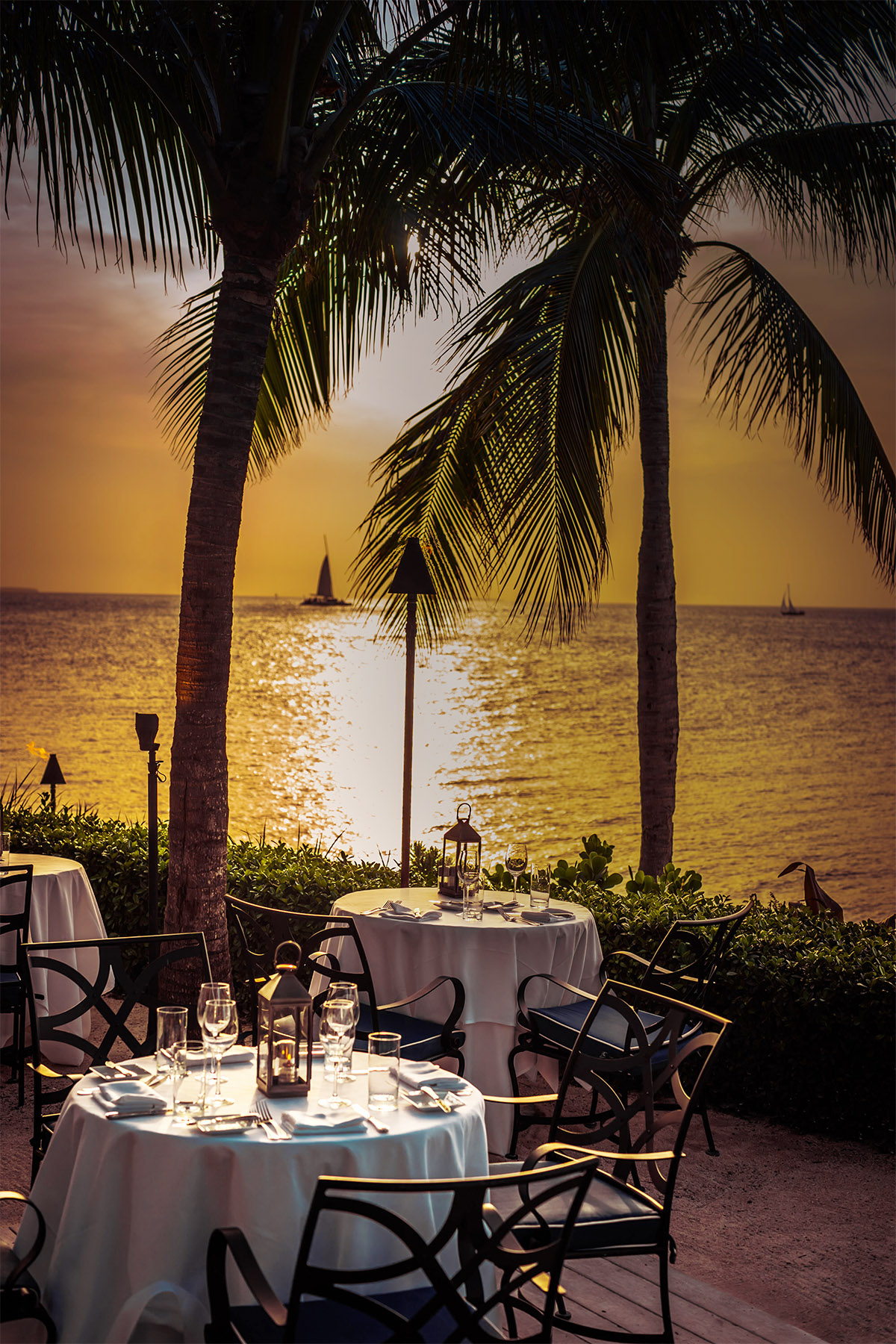
Golden Hour: At Sunset Key’s waterside restaurant, you dine on lobster tail, crab cakes, and “the best Key lime pie in Key West” with a side of ocean breeze.
James Lennon, Courtesy of Sunset Key Cottages
Key West, Florida
Sunset Key Cottages

We arrived at the Margaritaville Key West Resort & Marina late in the afternoon to catch a ferry for the short trip across the harbor to its sister property, Sunset Key Cottages, where we’d be staying. It was like we had shown up late to a party. There was a mix of tourists and locals already gathered at the marina for the sunset, watching the sky light up with swirls of peach and orange and purple, as vivid as the tie-dyed t-shirts from the tourist-trap shops behind us.
The situation only improved when we left our cottage for dinner at the on-island restaurant Latitudes, a table for two on the edge of the water with palm trees hovering above.
A few minutes later, the ferry (the Lil Princess) took us directly toward that riot of color and the private island where our private cottage with full kitchen and wraparound terrace was located. The cottage was called Paradise and—looking out through the floor-to-ceiling windows at the beach and the ocean beyond it—it felt a lot like it. Especially when we took the provided Bluetooth speaker out onto the porch and danced to Buena Vista Social Club, getting into the rhythm of the place, just 90 miles from Cuba.
The situation only improved when we left our cottage for dinner at the on-island restaurant Latitudes, a table for two on the edge of the water with palm trees hovering above. We dined on lobster tail, crab cakes, steak tartare, and “the best Key lime pie in Key West,” a claim that it seems every establishment in the city is required by law to make, no different from passing health inspections and keeping up with building codes. (It was good.)
The next morning, we relaxed with massages in the spa nearby the restaurant and then unwound even further on chaise lounges on the private beach about a dozen steps from our back door.
Later, we explored more of Key West, seeing Ernest Hemingway’s old home and Judy Blume’s current bookstore (Books & Books), as well as giant iguanas that looked like forgotten miniature dinosaurs; ancient trees with bizarre roots and tangled limbs that might have been alien species (especially a sprawling kapok tree near the resort); and chickens. So many chickens. Pretty much everywhere on every street, strutting around like they owned the place. I guess maybe they kind of do. And you can, too—for a few nights. — Zac Crain
San Pedro, Belize
Victoria House Resort & Spa

The Tropic Air flight from Belize City to San Pedro is brief and breathtaking, a 15-minute tour through the jungle of the mainland over the turquoise waters of the world’s second-largest coral reef. The heart of the Ambergris Caye, San Pedro was once a sleepy fishing village, and despite booming development, the colorful town still epitomizes island living with its sandy dirt roads and relaxed pace.
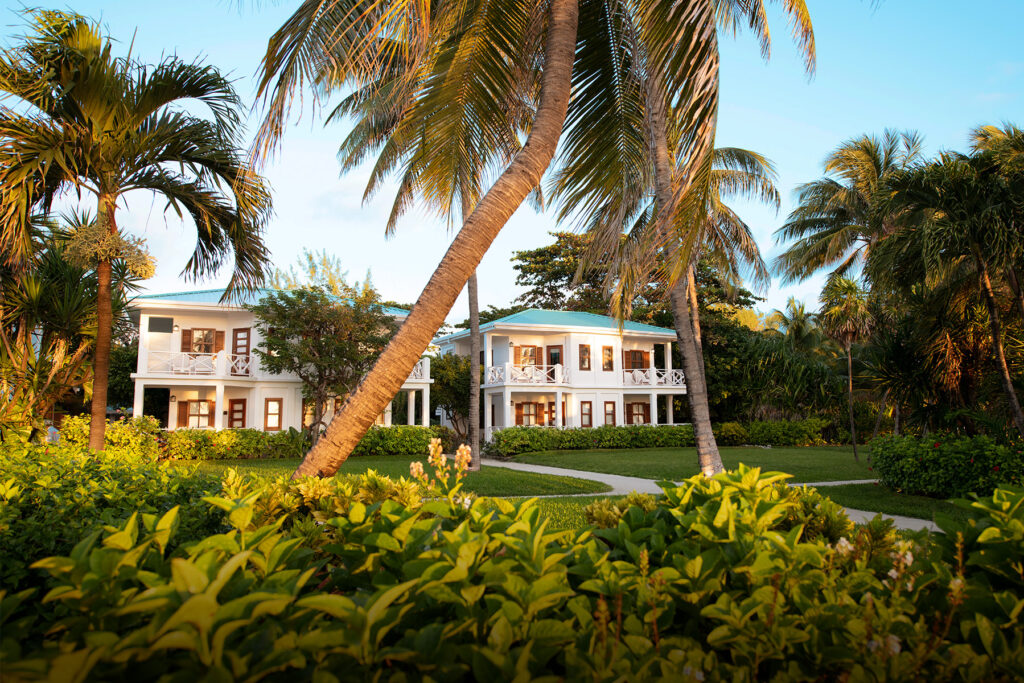
Head 20 minutes south of the airport, where you’ll find Victoria House, a gorgeous, colonial-style property with luxurious suites, casitas, and family-friendly houses facing the water.
Elizabeth Lavin
Hop on a golf cart (the preferred mode of transportation on La Isla Bonita), and head 20 minutes south of the airport, where you’ll find Victoria House, a gorgeous colonial-style property with luxurious suites, casitas, and family-
friendly houses facing the water. The shore is sandy and manicured—not a beach, per se, but a perfectly lovely place to sunbathe and sip a mojito.

Hook ‘Em: Ambergris Caye may be the easiest-to-reach bonefish, tarpon, and permit fishing destination in the Caribbean. Dallas-based Tailwaters Fly Fishing will set you up with a fully outfitted trip.
Elizabeth Lavin
Besides, San Pedro offers something much more exciting than splashing on the coast: the Belize Barrier Reef is brimming with sea life, providing world-class snorkeling and diving just minutes away from the island. The Hol Chan Marine Reserve and aptly named Shark Ray Alley are the most popular spots, but you’d be wise to avoid the crowds and head straight to Mexico Rocks, a less-traveled reef complex north of San Pedro. You’ll see hordes of colorful fish, rays, sea turtles, and, if you’re lucky, a shimmering barracuda the local guides have named Peter.
The possibilities for day trips from San Pedro are practically endless. Experienced divers may journey to the alluring Great Blue Hole. Those looking for a leisurely sail can take a catamaran to the nearby Caye Caulker, a tiny bohemian isle that’s big among young crowds; or Goff’s Caye, a remote, picture-perfect sandbar that’s not too far from where you can see endangered manatees in the wild. Dallas-based Tailwaters Fly Fishing Co. offers flats-fishing excursions for bonefish, tarpon, barracuda, and more. For a quick change of scenery, make the half-hour drive on bumpy roads through mangrove swamps to Secret Beach, a deceivingly named spot to take in the sunset with a drink in hand.
Victoria House’s Palmilla Restaurant is nice for a formal dinner—and they’ll provide a romantic, waterfront setup upon request—but for lunches and snacks in town, check out Belizean favorites El Fogon and Elvi’s Kitchen. As far as nightlife, Sunset Lounge, a trendy rooftop patio, is your best bet for cocktails and dancing. Or set up shop in a floating innertube at the famous Palapa Bar, where you can cool off in the water and listen to live local music. — Natalie Gempel
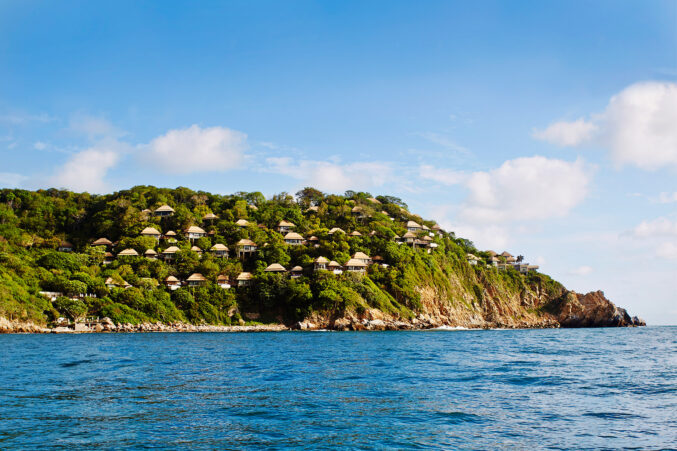
The resort is positioned on the private tip of a peninsula on a quiet bay far from the party beaches of Elvis’ Acapulco.
Elizabeth Lavin
Acapulco, Mexico
Banyan Tree Cabo Marqués

I wouldn’t have imagined that my 48th birthday would be the best of my life, but after a Thai massage, a mole cooking class, a tequila and antojito tasting, a surprise birthday cake with a tennis racket made of chocolate on top, and a spectacular cliff-top viewing of my last sunset of 47—accompanied by a strangely balletic performance by a pod of pelicans—I had to admit it was.
There is nothing like this place, but I don’t really want to tell you about it. I don’t like sharing. I also don’t particularly like sand or the ocean winds that usually blow it into my gas permeable contact lenses, feeling like tiny glass shards. Which is why the Banyan Tree Cabo Marqués is made for me.
Start with the fact that Acapulco recently opened a new, modern terminal, and American Airlines just introduced a direct flight from Dallas. It takes about 10 minutes to get from the gate to the exterior, and vice versa. Add to that the fact that East Coasters from both above and below the border have to take a connecting flight to get here, so they tend to stay on the Gulf side, leaving Acapulco, on the Pacific coast, mostly to upscale vacationers from Mexico City and South America. Plus, the resort is positioned on the private tip of a peninsula on a quiet bay far from the party beaches of Elvis’ Acapulco. Yes, please.
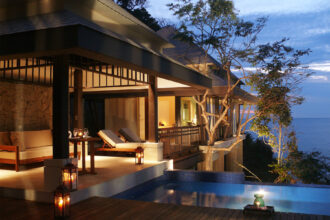
Night Swimming: Private villas are set on top of a rocky cliff, with mountains to your right, the Pacific Ocean in front of you, and a landscaped jungle full of flowering trees and tropical birds to your back.
Elizabeth Lavin
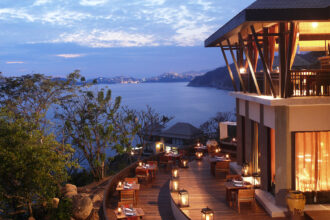
From the patio of Saffron, the resort’s signature Thai restaurant, you can see the lights of Acapulco across the bay. The concierge will happily arrange an excursion to see the famous La Quebrada Cliff Divers
Elizabeth Lavin
And the views. You’re on top of a rocky cliff, with mountains to your right, the Pacific Ocean in front of you, and a landscaped jungle full of flowering trees and tropical birds to your back. You can view it all from the heated infinity plunge pool on your private villa’s lanai, while waiting for your private chef to show up with a barbecue grill to cook you a six-course meal of grilled surf and turf that you’ll enjoy, with only nominal embarrassment, in your bathrobe.
This isn’t really a place for kids, adventure seekers, or ocean swimmers. It’s a place for reading three memoirs in three days, skinny dipping in your private pool, and finding yourself staring out at the horizon for far longer than you ever thought you could. It’s a place for me. —K.W.
Grand Cayman
Kimpton Seafire Resort & Spa

The 76-square-mile Grand Cayman is a tax haven in paradise where a quiet billionaire has bought up more land than the government owns and is rebuilding it in his image. That billionaire is the investor Kenneth Dart, and his latest project is the Kimpton Seafire, which stands near the edge of Seven Mile Beach’s long footprint of development. It was the island’s first new resort in more than a decade, and it seems tailor-made for those who value outdoor yoga and bootcamp sessions and appreciate complimentary wine poured at 5 pm. (This is all included in your resort fee; yoga mats are in every room.)
Each of the 266 rooms features floor-to-ceiling windows with views of the ocean and private patios. The suites offer automated blinds, making it easy to stay in bed and watch the sunrise. You’ll want to walk the beach in the morning, lazily dip in the ocean in the afternoon, and watch the sun set over the horizon as night falls.
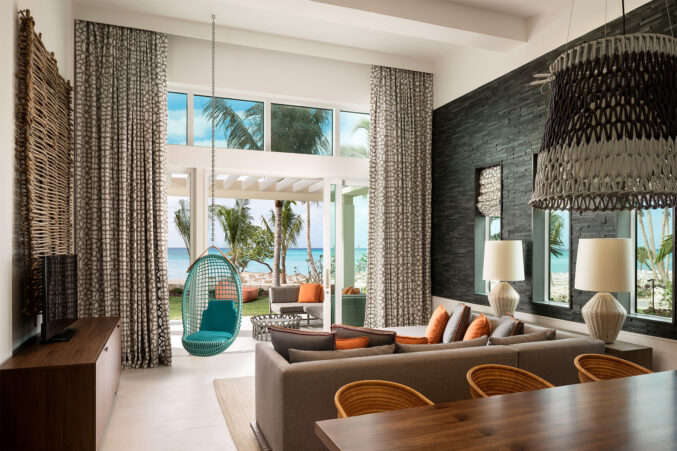
Free Parking: Beachfront bungalows offer daily break- fast delivery, an in-room crafted nightcap, loaner PUBLIC Bikes, and extra privacy.
Courtesy of Kimpton Seafire Resort & Spa
Of course, Cayman isn’t all Seven Mile Beach. Make time for Stingray City, where the undulating creatures will nibble on squid from between your fingers. Locals will send you to Mango Tree, in George Town, where you can feast on braised oxtail and wash it down with a Caybrew, the locally made lager. At night on the West Bay, Macabuca, the tiki bar behind the fancier Cracked Conch, lets you sip a mai tai while watching divers disappear in the dark water.
The coral reefs here are some of the Caribbean’s most highly protected, so prioritize snorkeling or scuba diving. Cemetery Beach is just a mile from the Seafire, where you can rent snorkeling equipment and swim out a couple of hundred yards to a reef. (Make sure you bring a life vest and flippers—the water is about 10 feet deep.) On the north side of the island, Rum Point offers the same picturesque views as Seven Mile with fewer tourists and shallower waters for swimming.
There is some local angst about the influence of big money here. Calico Jack’s, the divey beach bar next to the Seafire, plans to move after 15 years when its lease is up. The rumor is that Dart wants to open a wine bar. As the bartender tells me about this, I can hear reggaeton blasting from a nearby pavilion, where about a dozen locals are playing dominoes and drinking beer. They hand me a Budweiser. Seven Mile’s resorts aren’t far, and neither are moments like this. —Matt Goodman
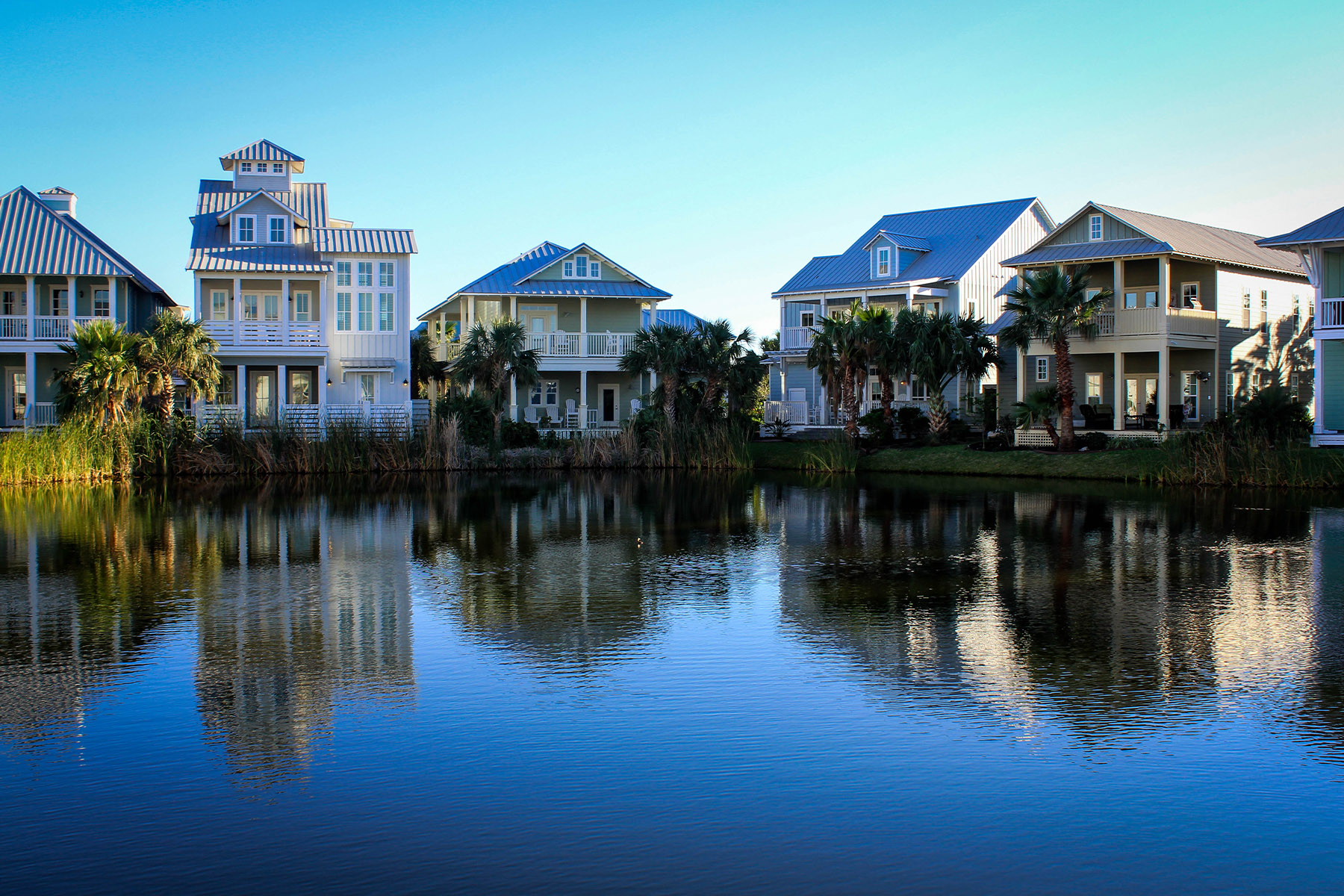
Cinnamon Shore
Courtesy of Cinnamon Shore
Port Aransas
Cinnamon Shore and Sunflower Beach
 Not all enviable beach destinations require a flight and a passport. If you can fit your gear in a car and keep the kids entertained for a 6.5-hour drive south, you don’t even have to cross state lines for a proper toes-in-the-sand experience. The residents of Port Aransas have rebuilt their beach community since the ravages of Hurricane Harvey four years ago, and three master-planned resort communities have emerged on the shores of Mustang Island. Branding themselves The New Texas Coast, they offer opportunities to buy or rent a beachfront property. The Charleston-style vacation homes at Cinnamon Shore and Sunflower Beach range from cozy cottages to a three-story manse that can sleep up to 10 (plus 10 more in the bunkroom). —C.N.
Not all enviable beach destinations require a flight and a passport. If you can fit your gear in a car and keep the kids entertained for a 6.5-hour drive south, you don’t even have to cross state lines for a proper toes-in-the-sand experience. The residents of Port Aransas have rebuilt their beach community since the ravages of Hurricane Harvey four years ago, and three master-planned resort communities have emerged on the shores of Mustang Island. Branding themselves The New Texas Coast, they offer opportunities to buy or rent a beachfront property. The Charleston-style vacation homes at Cinnamon Shore and Sunflower Beach range from cozy cottages to a three-story manse that can sleep up to 10 (plus 10 more in the bunkroom). —C.N.
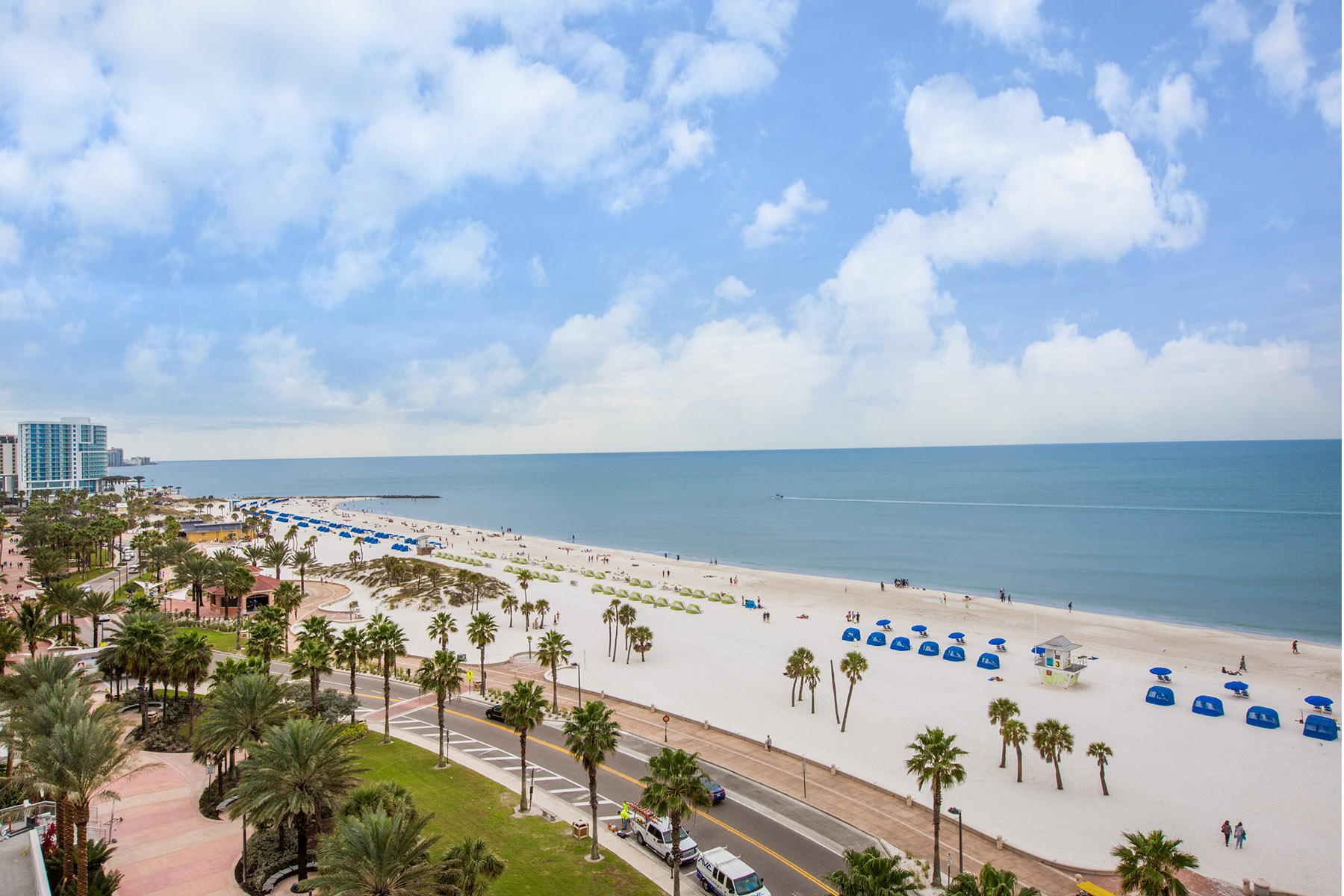
Clearwater Beach, Florida
Courtesy of Wyndham Grand Clearwater Beach
Clearwater Beach, Florida
Wyndham Grand Clearwater Beach
 I toss my luggage on the sofa, shimmy into my swimsuit, and make a beeline for the water. I slip my feet out of my slides and touch my toes to the sand the way one does with a freshly poured bath before sinking into the tub. The sand doesn’t scald; it’s soft and a temperature similar to lukewarm porridge. Spanning 2.5 miles along the Gulf of Mexico, Clearwater was named the best beach in the United States by TripAdvisor in 2019. Likely something to do with the sand. Those looking to escape and unplug from their day-to-day will find what they’re looking for at the Wyndham Grand Clearwater Beach. There’s Ocean Hai, an Asian-fusion seafood restaurant with executive chef Claude Rodier at the helm; two bars; a spa; and a beach-facing pool with a hot tub. —C.D.
I toss my luggage on the sofa, shimmy into my swimsuit, and make a beeline for the water. I slip my feet out of my slides and touch my toes to the sand the way one does with a freshly poured bath before sinking into the tub. The sand doesn’t scald; it’s soft and a temperature similar to lukewarm porridge. Spanning 2.5 miles along the Gulf of Mexico, Clearwater was named the best beach in the United States by TripAdvisor in 2019. Likely something to do with the sand. Those looking to escape and unplug from their day-to-day will find what they’re looking for at the Wyndham Grand Clearwater Beach. There’s Ocean Hai, an Asian-fusion seafood restaurant with executive chef Claude Rodier at the helm; two bars; a spa; and a beach-facing pool with a hot tub. —C.D.
Credit: Source link































